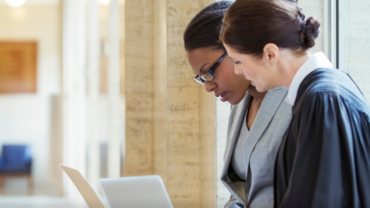Courts across the U.S. have had to make unprecedented decisions about how to continue serving justice as the COVID-19 pandemic transforms life.
Thomson Reuters spoke recently to Mary McQueen, president of the National Center for State Courts, about how courts are considering the needs of staff, litigants and the public as they adapt to the crisis and develop recovery plans.
As she helps state courts navigate the outbreak, McQueen says she is guided by Alexander Hamilton’s remark in Federalist No. 17 that nothing contributes more to the public’s respect and esteem for government than the effective administration of justice.
The NCSC also seeks to provide support to judicial systems beyond the U.S.
”As we all talk about the pandemic being global, justice is, too, in some ways,” McQueen said, explaining plans to leverage the organization’s pandemic research website into an international resource.
Her multifaceted discussion of court operations in the midst of COVID-19 provides insight into how courts are rising to the occasion and how they, like many Americans, are concerned about financial consequences.
Below are excerpts from the conversation that have been edited for clarity and brevity.
The influence of prior public health crises
McQueen began by explaining how the NCSC and other judicial system organizations realized the need to plan for a public health crisis.
You remember the Ebola outbreak in 2014? And the bird flu in 2008?
After the Ebola case, a nurse who came back from Africa went to Maine. She initiated a lawsuit challenging the state’s ability to quarantine her, and the trial court judge in Maine ruled in her favor.
After the Maine case we felt it was important to create a work group to develop materials to prepare judges to hear pandemic cases.
We invited the National Governor’s Association and the National Council of State Legislatures along with the trial judge from Maine and a professor from the University of Houston Law School to develop a benchbook or handbook on pandemics for judges. I think the Ebola crisis was the first time that the Conference of Chief Justices [and] the National Center for State Courts thought about the need to prepare courts for pandemics.
A year ago, Chief Justice Mike Heavican, the chief justice in Nebraska, hosted a [national pandemic] summit. We all know University of Nebraska and Creighton Law School have that major isolation designation for the country. And the Conference of Chief Justices and [Conference of] State Court Administrators have an emergency preparedness committee that regularly considers continuity-of-operation plans, called “coop” plans, to ensure that court plans are up to date.
When the COVID-19 crisis hit, courts had an outline to follow and just basically moved forward with implementation. As early as February of this year, courts were initiating those public safety plans that had been previously adopted.
But nothing prepared us for the coronavirus; the depth of the crisis was much broader and faster than anticipated.
Power to act
McQueen explained that before chief justices and other court leaders could determine how to respond to the virus, they had to determine what authority they had to respond.
The bigger challenge I think we have is the actual authority of a chief justice to lead the court.
I’ll give you an example. Georgia is a decentralized state. Basically, the courts are locally funded and administered. The Supreme Court has very little authority to manage the local courts.
But in Georgia, for instance, the legislature passed a statute that gave the chief justice some additional authority during emergencies.
I think the courts are trying to look at what emergency authority do courts have and what emergency authority do courts need. In some states, courts have the authority to waive, for example, the statute of limitations, but in other states it requires legislative action.
So, courts are trying to manage COVID-19 within existing authority
Responding to COVID-19
McQueen emphasized that the crisis has shifted but not shuttered court operations.
The courts are not closed. Justice is still accessible, but courts have basically a triage approach to determine what types of hearings or cases can be postponed.
Of course, when people are actually incarcerated, conforming to speedy trial rules could mean giving priority to criminal cases.
We’re seeing a lot of efforts across the country to either restrict, delay or cancel civil jury trials. We’re also seeing restriction of access to courthouses.
Whether through court order or working with the legislature, suspension of certain types of statutes of limitations, granting extensions in evictions and deadlines in mortgages, and suspension of fines and fees have been adopted.
The California Judicial Council adopted a statewide emergency bail schedule that basically had zero financial fines for most misdemeanors and low-level felonies.
Enforcing quarantines
According to McQueen, the pandemic has caused courts to rethink compliance with quarantine orders and other response measures.
For example, some people are refusing to follow isolation or quarantine orders. Judges working with law enforcement must consider how the courts can support enforcement of these orders.
I’m sure you’ve read and heard on television where some jurisdictions have used the GPS ankle bracelets. But there have been a couple of incidents that have come to our attention where the defendant would still leave the house, so they had to actually place sheriff’s deputies around the offender’s home.
How would traffic stops at state borders be enforced?
For instance, there was a separate statute in Texas regarding quarantine.
Rather than train every judge in Texas to enforce quarantine, Chief Justice Hecht decided to select and train a team of trial court judges to become the quarantine enforcement experts.
So, if a warrant is needed, law enforcement knows which judge to call. They are sufficiently trained to handle these types of warrants and orders, rather than having everybody come up with their own method.
The rapid adoption of technology
Courts are embracing technology while adhering to foundational judicial system values, McQueen said.
I think almost every state has embraced some type of virtual hearing. I was talking to [Chief Justice] Nathan Hecht a week ago. He was just shocked that there were over 1,000 virtual hearings in Texas. When I talked to him this past Friday he said that [number] was 4,000 now.
What I think the Conference of Chief Justices takes very, very seriously is not allowing the technology to in any way impede or waive constitutional rights.
You can imagine how fast and how broadly you can use technology in a criminal case where you have a right of confrontation and cross-examination, but we haven’t seen a virtual jury trial yet.
Along with these logistical issues, courts have to weigh the legal rights and the constitutional protections that are so important to the public, when preparing the judicial system to respond to pandemic emergencies.
Impacts on staff
McQueen also discussed trying to protect courthouse staff from a variety of risks.
Courts are also supported by a professional workforce that has to be protected
It reminds me somewhat of the hospital model, but certainly not at the level of life and death that the medical personnel face.
Court manage some of those same kinds of issues, assigning and protecting their workforce
It’s very hard for a courtroom clerk to telework. It’s very hard for the records manager to telework. There’s been a lot of concern about how protect the court’s staff while continuing to provide justice.
Courts helping small businesses
McQueen described a court-created program aimed at helping businesses weather the economic impacts of COVID-19.
In Rhode Island, last week the court announced a business recovery plan by creating a nonliquidating receivership program.
Basically, businesses that were successfully operating before COVID-19 — no business problems, keeping up with their debts before February — could apply in the trial court in Rhode Island, for a nonliquidating receivership.
The program requires a small business to file a plan with the superior court that would then appoint a receiver who is a lawyer. The receivership protects your assets as long as you’re operating under this approved plan. If the business doesn’t operate under this approved plan it does run the risk of being placed into a traditional receivership,
With limited exceptions, the program would provide some protection for these small businesses while they’re trying to recover.
This innovative program was established through court order. Courts always consider, “What can we do?” within our constitutional authority.
Financial concerns
The NCSC is bringing attention to the financial toll the pandemic is having on courts, according to McQueen.
One of the things that really concerns me is the economy, and especially the revenue loss at the state level because less than one-tenth of 1% of the revenue that comes into a state ever finds its way to the courts.
The cost of trying to get courts back to where they were pre-COVID-19, as people are looking at adopting the budgets for 2020, what is it going to look like for 2021?
I’m very concerned about the impacts not only on the general economy but specifically on the courts. Because if we thought 2008 was bad, this is going to be devastating.
The federal money that has been approved to help states recover from COVID-19 doesn’t recognize the challenges facing state courts. The NCSC is trying to work with Congress on both sides of the aisle to ensure that the needs of all three branches of state government are included.
In the middle of a crisis, people’s lives and the medical needs certainly should come first, but if something keeps me up at night, court recovery is one of them.
A new normal
Even as the coronavirus outbreak continues to unfold, McQueen said judicial leadership is planning for managing post-pandemic dockets.
Is there going to be, for instance, a tsunami, where all these cases that have been postponed due to the pandemic overwhelm the court system?
We’re trying to prepare in the future for how we would bring the courts back because there’s going to be some effort to say “this worked so great, why don’t we just continue in this direction?”
You can go back to Hamilton and talk about the importance of people being able to see justice as well as experience it. I think for us it’s going to be, as we come back, what is the new normal for courts?






